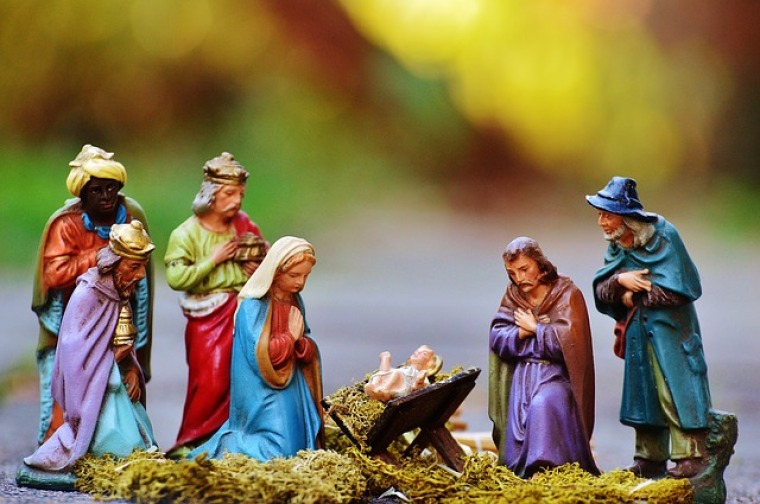Christian charity removes Bible references from Nativity story to avoid confusing unchurched children

A Christian charity has decided to omit references to the Bible in its simplified nativity booklet this Christmas in an effort to avoid confusing children who do not attend church.
The Scripture Union, one of the UK's oldest Christian organizations for young people and children, said that its annual book about the Christmas story will be trimmed down this year because many children do not know the basics.
"When we realised that children don't even know the basics of what they are celebrating, then the traditional, simple story is the best way," said Jennifer Babb, church and community fundraising manager at the Scripture Union, according to The Telegraph.
The booklets previously included references to Bible verses so that readers can compare the story to the Gospels. But this year's version is a simplified nativity which assumes that children know very little about the Jesus' birth.
The charity aims to send the booklet out to 100,000 children, and Babb said that the removal of explicit references to the bible "takes that barrier away, it makes it more of a simple story."
The Telegraph noted that the this year's version, written by Gemma Willis, includes the story of Mary's visit from an angel, Joseph's dream, the couple's journey to Bethlehem and the birth of Jesus.
In previous versions, the nativity booklet included the visits of the shepherds and wise men, the family's flight to Egypt, and their first visit to the temple.
Babb said that the decision was made in response to several polls that showed the scale of the children's lack of knowledge about the Christmas story.
When the free booklet was unveiled on Thursday, Paul Stockwell, the head of fundraising for Scripture Union, told Premier: "We see surveys from different retailers where they ask children and young people what they think Christmas means. They're a bit of fun but they do show that knowledge of the Christian faith and the Christian story is slowing dwindling amongst the next generation."
The findings of a study conducted in 2014 revealed that one in three children between the ages of 10 and 13 do not know that Christmas celebrates the birth of Jesus.
Figures released by the Children's Society in 2013 showed that one in 10 children believe that Dec. 25 marks the birth of Santa Claus.
"We wanted to create something new this year that was specifically designed for the audience of children who might not know the real Christmas story. This is all part of our work to invite children and young people to explore the difference Jesus can make to the challenges and adventures of life," Babb said.
According to Premier, most of the 105,000 copies that have been printed are being distributed to disadvantaged children through food banks, hospitals and a charity that supports families with a jailed parent.
 Christians don't have to affirm transgenderism, but they can’t express that view at work: tribunal
Christians don't have to affirm transgenderism, but they can’t express that view at work: tribunal Archaeology discovery: Medieval Christian prayer beads found on Holy Island
Archaeology discovery: Medieval Christian prayer beads found on Holy Island Presbyterian Church in America votes to leave National Association of Evangelicals
Presbyterian Church in America votes to leave National Association of Evangelicals Over 50 killed in 'vile and satanic' attack at Nigerian church on Pentecost Sunday
Over 50 killed in 'vile and satanic' attack at Nigerian church on Pentecost Sunday Ukrainian Orthodox Church severs ties with Moscow over Patriarch Kirill's support for Putin's war
Ukrainian Orthodox Church severs ties with Moscow over Patriarch Kirill's support for Putin's war Islamic State kills 20 Nigerian Christians as revenge for US airstrike
Islamic State kills 20 Nigerian Christians as revenge for US airstrike Man who served 33 years in prison for murder leads inmates to Christ
Man who served 33 years in prison for murder leads inmates to Christ


 Nigerian student beaten to death, body burned over ‘blasphemous’ WhatsApp message
Nigerian student beaten to death, body burned over ‘blasphemous’ WhatsApp message 'A new low': World reacts after Hong Kong arrests 90-year-old Cardinal Joseph Zen
'A new low': World reacts after Hong Kong arrests 90-year-old Cardinal Joseph Zen Iran sentences Christian man to 10 years in prison for hosting house church worship gathering
Iran sentences Christian man to 10 years in prison for hosting house church worship gathering French Guyana: Pastor shot dead, church set on fire after meeting delegation of Evangelicals
French Guyana: Pastor shot dead, church set on fire after meeting delegation of Evangelicals ‘Talking Jesus’ report finds only 6% of UK adults identify as practicing Christians
‘Talking Jesus’ report finds only 6% of UK adults identify as practicing Christians Mission Eurasia ministry center blown up in Ukraine, hundreds of Bibles destroyed: 'God will provide'
Mission Eurasia ministry center blown up in Ukraine, hundreds of Bibles destroyed: 'God will provide' Church holds service for first time after ISIS desecrated it 8 years ago
Church holds service for first time after ISIS desecrated it 8 years ago Burger King apologizes for 'offensive campaign' using Jesus' words at the Last Supper
Burger King apologizes for 'offensive campaign' using Jesus' words at the Last Supper Uganda: Muslims abduct teacher, burn him inside mosque for praying in Christ’s name
Uganda: Muslims abduct teacher, burn him inside mosque for praying in Christ’s name